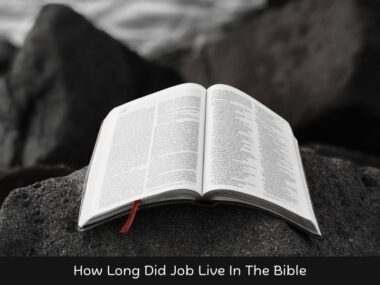Few biblical narratives probe the depths of human suffering as powerfully as the Book of Job. As one of Scripture’s oldest texts, it wrestles with questions that still echo across generations: Why do the righteous endure pain? Where is God in our darkest moments?
At its heart stands Job—a man of unwavering integrity, yet subjected to unimaginable loss. His story is not one of punishment, but of divine purpose. Stripped of wealth, health, and even his children, Job becomes the focal point of a celestial challenge that tests the very nature of faith itself.
More than an ancient account, Job’s ordeal mirrors our struggles with injustice and unanswered prayers. His journey invites us to confront life’s hardest questions—not with easy answers, but with the courage to seek meaning amid suffering. This is why Job’s story endures: it speaks to the universal human experience of pain, perseverance, and the search for God’s presence when He seems most distant.
Origin and Authorship
The authorship of Job remains unknown, though many scholars attribute its final form to a sage or wisdom writer, possibly during the time of Israel’s exile (6th century BCE). Its literary sophistication and theological complexity suggest a writer deeply immersed in Hebrew wisdom traditions. Some traditions credit Moses or Solomon, though no definitive evidence exists. Regardless of its author, the book’s structure and philosophical depth place it among the wisdom literature alongside Proverbs and Ecclesiastes. The anonymity of its author underscores its universality — Job’s story is every person’s story, transcending time, nation, and authorial identity.
Cultural and Historical Background
Job is believed to have lived during the patriarchal period — around the time of Abraham, Isaac, and Jacob. This is suggested by the way wealth is measured (in livestock), the lack of reference to Mosaic law, and the length of Job’s life. Culturally, the worldview of the time saw prosperity as divine reward and suffering as punishment. This belief shaped how Job’s friends interpreted his downfall. The book challenges that simplistic view, illustrating that suffering can exist even when one is righteous. The backdrop reveals a society struggling with divine justice, much like we do today.
Structure of the Book of Job
The Book of Job is masterfully structured, blending poetry and prose to narrate a complex spiritual journey. It begins with a prose prologue (chapters 1–2), moves into poetic dialogues and monologues (chapters 3–41), and concludes with a prose epilogue (chapter 42). This literary form heightens the emotional weight and theological gravity of the text. The shift from narrative to poetry reflects Job’s inner turmoil and deepens the existential wrestling that defines the book. Understanding the structure allows readers to appreciate how Job’s physical and emotional suffering is matched by a literary form that invites reflection and awe.
Prologue: The Heavenly Court and Job’s Initial Suffering
The prologue introduces Job as a “blameless and upright” man, blessed with family, wealth, and reputation. In a dramatic heavenly scene, Satan challenges Job’s integrity, claiming that his righteousness is conditional on his prosperity. With God’s permission, Satan strips Job of his wealth, children, and health. Despite unimaginable loss, Job refuses to curse God, uttering the famous words: “The Lord gave, and the Lord has taken away; blessed be the name of the Lord” (Job 1:21). This section sets the stage for the central conflict: can faith endure suffering, and is righteousness genuine if it comes with no reward?
Dialogue: Conversations with Job’s Friends
The dialogues between Job and his friends — Eliphaz, Bildad, and Zophar — occupy a significant portion of the book. Each friend insists that Job must have sinned to warrant such suffering, echoing the retributive justice theology of the time. Job, however, maintains his innocence and accuses them of lacking compassion and understanding. These exchanges are raw and emotional, reflecting the complexity of grief, theology, and friendship. Job’s frustration builds as the friends offer pious platitudes rather than true comfort. Their words deepen Job’s sense of isolation and highlight a major theme: the failure of human wisdom to explain divine action.
Monologues: Elihu’s Perspective
Elihu, a younger man who speaks after the three friends are silent, offers a different perspective. He criticizes both Job and his friends — Job for justifying himself over God, and the friends for failing to refute Job wisely. Elihu proposes that suffering may serve as divine discipline, not necessarily punishment, aiming to refine rather than condemn. Though his speech is lengthy and sometimes rambling, Elihu prepares the way for God’s response by reminding Job of God’s greatness. His role is complex: part rebuke, part bridge. He challenges assumptions, yet also preserves reverence, subtly shifting the narrative toward divine revelation.
Theophany: God’s Response to Job
When God finally speaks from the whirlwind, it is not with answers, but with questions. God challenges Job’s limited understanding, pointing to the majesty of creation — the seas, the stars, the creatures of the earth. The message is clear: Job’s knowledge is finite, and divine governance is far more intricate than humans can comprehend. This theophany doesn’t explain Job’s suffering but reveals God’s sovereignty and wisdom. Job is humbled. He sees that his demand for answers was born of pride, not faith. In this divine encounter, Job experiences something greater than clarity — he encounters God Himself.
Epilogue: Restoration and Conclusion
In the epilogue, Job is restored — not just in wealth and family, but in spiritual depth. God vindicates Job, rebukes his friends, and instructs them to seek Job’s intercession. Job prays for them, demonstrating his renewed humility and compassion. He receives double what he lost and lives a long life. However, the restoration doesn’t negate the pain he endured. Instead, it affirms that suffering doesn’t mean divine rejection. The story concludes not with an explanation, but with a transformation. Job has seen God, and that vision reshapes everything. His journey reminds us that faith is not about answers, but relationship.
Job: The Righteous Sufferer
Job is introduced as “blameless and upright,” a man of integrity who fears God and shuns evil. His righteousness is not superficial — it permeates his actions, thoughts, and leadership in his community. Yet despite his exemplary life, he endures catastrophic suffering. Job’s journey is not one of physical endurance alone, but of emotional and spiritual testing. He mourns, questions, and even challenges God, yet never abandons his faith entirely. Through his lament and honesty, Job teaches us that faith can include doubt, and that spiritual maturity involves engaging God even in pain, not fleeing from Him.
Job’s Friends: Eliphaz, Bildad, and Zophar
Initially silent in Job’s grief, these three friends soon become relentless accusers. They represent traditional theology: that suffering is always the result of sin. Eliphaz appeals to experience and visions, Bildad to tradition, and Zophar to strict moral judgment. Their insistence on Job’s guilt, despite his integrity, shows how rigid theology can become cruel. While their intentions may have been to comfort, their words instead wound. Their dialogues serve as a warning against speaking on God’s behalf without understanding. They reflect the danger of trying to explain suffering with shallow answers rather than offering compassion and presence.
Elihu: The Young Challenger
Elihu appears after Job’s three friends give up. As the youngest, he waits to speak out of respect, but when he does, he brings a new angle. He criticises Job for claiming righteousness above God and chastises the friends for failing to answer Job wisely. Elihu proposes that God may use suffering to teach and refine rather than punish. While not condemned by God later, Elihu’s role is ambiguous. He functions as a transition, challenging but not accusing, defending God’s justice without fully resolving the issue. Elihu reminds readers that not all suffering fits simple categories.
God’s Role in Job’s Story
God’s role in Job’s story is both sovereign and mysterious. It is God who allows Satan to test Job, not as punishment, but to demonstrate Job’s faithfulness. Throughout the narrative, God remains mostly silent until the end, when He reveals His wisdom through creation. Importantly, God does not condemn Job’s questions, but He does correct his assumptions. By the end, God restores Job and rebukes his friends, affirming Job’s integrity. This portrayal shows a God who is not absent in suffering, but whose purposes transcend human understanding. God’s involvement is neither cruel nor careless — it’s sovereign and purposeful.
Themes and Lessons
The Nature of Suffering
Suffering is the central theme of Job’s story. He experiences unimaginable loss: wealth, children, health, and status. But the book teaches that suffering is not always linked to personal sin. It can be a part of divine purpose beyond human grasp. Job’s suffering is a test of faith, not a sentence of guilt. This challenges retributive justice — the idea that good people always prosper and the wicked suffer. The narrative invites us to explore suffering not as punishment, but as a means of spiritual deepening and dependence on God. It gives voice to human anguish and divine mystery.
Faith and Perseverance
Despite his agony, Job never abandons God. He may question, lament, and even accuse, but he never walks away. His perseverance is not stoic acceptance but an active wrestling with faith. He continues praying, speaking, and seeking truth. This raw honesty reveals that faith includes struggling through silence and confusion. Job shows that perseverance doesn’t mean having answers, but holding on when everything else is lost. His journey reminds us that God can handle our pain and questions, and that lasting faith often grows in the soil of suffering, not prosperity.
Divine Justice and Human Misunderstanding
Job’s friends insist on a version of justice where God always punishes wrongdoing and rewards righteousness. But Job’s experience disproves this. The book forces us to confront the complexity of divine justice — a justice that does not always look like fairness from a human perspective. God’s response to Job challenges the assumption that humans can fully understand divine reasoning. It’s not that justice doesn’t exist, but that it’s woven into a much grander narrative. The lesson is clear: we must be cautious in interpreting suffering, especially when assuming it reflects God’s judgment.
The Imperfection of Human Insight
One of the profound insights of Job is that human understanding has limits. Job, his friends, and even Elihu attempt to explain suffering and divine behavior, but all fall short. When God speaks, He does not explain Job’s suffering — instead, He illustrates how vast and complex the world is. This humbling moment reveals that humans are not equipped to fully grasp God’s purposes. The book encourages humility in theology and patience in suffering. It teaches that mystery is not the absence of truth, but the acknowledgement that some truths are bigger than we can hold.
Expressing Grief Through Prayer and Lament
Job’s prayers are not sanitized or calm — they are raw, angry, and filled with despair. He curses the day of his birth, pleads for relief, and accuses God of injustice. Yet in all this, he is not condemned. Instead, his honesty is eventually affirmed by God. This validates lament as a legitimate form of worship. Grief does not need to be silent or tidy; it can cry out, question, and wrestle. Job’s example permits to pray with pain, not just praise. His story teaches that God welcomes our real emotions, even when they come in brokenness.
Theological Implications
Suffering as a Revelation of God’s Nature
Job’s suffering reveals aspects of God’s nature that comfort and challenge us. Instead of depicting a deity who simply punishes wrongdoing, the story unveils a sovereign God who allows suffering for purposes beyond moral retribution. Job’s ordeal becomes a canvas on which God displays His wisdom, power, and mercy. Through suffering, God teaches humility, dependence, and awe. The story reframes suffering as not merely an obstacle, but a means of deeper revelation. Job’s encounter with God at the end is not intellectual — it is transformative. His pain becomes a path to profound spiritual insight.
The Mysteriousness of God’s Plans
One of the central theological themes in Job is that God’s plans are often beyond human comprehension. Job demands answers for his suffering, but when God responds, He offers none. Instead, He presents the vastness and intricacy of creation, suggesting that divine governance cannot be reduced to simple cause-and-effect. This mystery is not meant to frustrate, but to invite trust. Job’s story reminds us that we walk by faith, not by sight. The absence of clear answers is not the absence of God. Sometimes, the purpose of suffering is not revealed — but the presence of God is.
Understanding Divine Sovereignty
God’s sovereignty is portrayed as absolute in the Book of Job. Satan cannot act without divine permission. Nature, health, and even restoration fall under God’s command. This sovereignty is both comforting and complex — it means that nothing escapes God’s control, but it also means that suffering can occur within His will. The story forces us to reconcile a loving God with the existence of pain. In doing so, we learn that sovereignty doesn’t mean cruelty — it means purpose. Job’s story urges readers to trust that even suffering is held in the hands of a just and wise God.
Misconceptions and Corrections
Misinterpretations of Divine Justice
One of the most persistent errors corrected in Job is the idea that all suffering is punishment. Job’s friends embody this belief, assuming that Job must have sinned to deserve his fate. God firmly rejects this theology by affirming Job’s innocence and rebuking the friends’ faulty assumptions. The book teaches that divine justice is more complex than transactional karma. Righteous people may suffer, and wicked people may prosper — but this does not negate God’s justice. The real correction is theological: divine justice may not always be immediate, visible, or linear, but it is always active and righteous in the end.
The Faulty Counsel of Job’s Friends
Eliphaz, Bildad, and Zophar begin as supportive companions but quickly become harmful counselors. Their insistence that Job’s suffering must stem from sin shows the danger of rigid theology. They misrepresent God and wound Job further by offering easy answers to a complex reality. God later rebukes them, stating that they have “not spoken rightly” about Him. This moment validates Job’s struggle and cautions us against presumptuous spiritual advice. Their failure reminds us that in moments of deep pain, presence often matters more than preaching. Offering grace and listening can be more godly than offering theological explanations.
The Role of Suffering in Faith
Job’s journey redefines the role of suffering in the life of faith. Rather than undermining belief, suffering becomes a crucible that refines it. Job’s questions, complaints, and even accusations are not signs of faithlessness — they are expressions of a living, wrestling faith. His honesty draws him closer to God, not further away. In the end, Job doesn’t just regain what he lost; he gains a deeper, more personal understanding of God. Suffering, then, is not merely something to endure — it is something through which we can grow. True faith is not tested in prosperity but in adversity.
Practical Insights and Modern Applications
Coping with Grief
Job’s story offers a blueprint for processing grief. He tears his clothes, sits in ashes, and speaks his anguish openly. He does not rush to healing or pretend to be okay. His raw honesty shows that grief is not a lack of faith — it’s a natural and necessary response to loss. Modern readers can learn to give themselves and others permission to grieve fully. Suppressing sorrow often prolongs suffering. By naming his pain and taking it to God, Job models a path toward eventual restoration. His story affirms that grief is a sacred space where God meets us.
Maintaining Faith Amidst Adversity
Job’s unwavering commitment to God, even when confused and broken, is a powerful example of enduring faith. He loses everything — yet he refuses to curse God. His faith is not passive or resigned; it is fierce, questioning, and persistent. In modern life, when hardship strikes, Job reminds us that faith doesn’t mean never doubting — it means holding on through the doubt. His prayers, though anguished, keep him in relationship with God. The takeaway is clear: faith that survives adversity is not perfect faith, but persevering faith. Sometimes, staying connected to God is the victory.
Recognizing Limitations in Human Perspective
One of the humbling lessons of Job is that human perspective is limited. Job’s friends are certain of their judgments. Job is certain of his innocence. But God’s perspective reveals a much broader reality — one that no human character fully grasped. Today, this serves as a warning against quick assumptions, especially in times of crisis. It also offers peace: not everything must make sense to us for it to have meaning. Recognizing our limitations is not defeat — it’s wisdom. Trusting in God’s greater understanding helps us navigate life with humility and hope, even in the dark.
Conclusion
The story of Job is not just about suffering — it is about the transformation that can occur through it. Job loses everything but finds something greater: a deeper knowledge of God, a renewed sense of humility, and a restored purpose. What Job went through in the Bible teaches us that pain is not always punishment, questions are not always rebellion, and restoration is always possible. His story invites readers across all generations to bring their grief, doubts, and faith before a sovereign God who listens, speaks, and restores.







